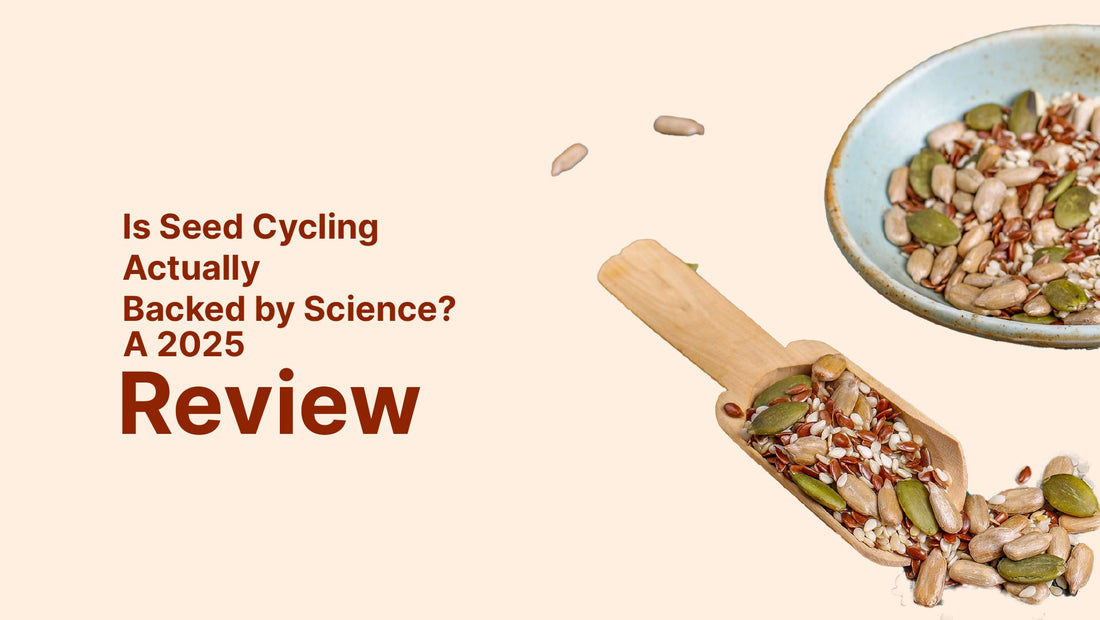
Is Seed Cycling Actually Backed by Science? A 2025 Review
Share
With growing interest, it’s time to separate myth from fact.
As conversations around hormonal health and natural menstrual support gain traction, seed cycling has found its way into the spotlight—especially in wellness-forward communities in India and globally. From balancing estrogen and progesterone levels to reducing PMS symptoms, the promise of this ancient-meets-modern nutrition ritual is alluring. But does science back it up? This 2025 review dives into the clinical studies, expert insights, and real-world impact of seed cycling to help you decide if it’s more than just a trend.
What is Seed Cycling?
Seed cycling is a functional nutrition approach that involves rotating four specific seeds—flax, pumpkin, sesame, and sunflower—throughout the menstrual cycle. The method is divided into two phases:
- Follicular Phase (Day 1–14): Flax seeds and pumpkin seeds, believed to support estrogen production.
- Luteal Phase (Day 15–28): Sesame seeds and sunflower seeds, thought to promote progesterone balance.
This practice is popular in India’s hormonal nutrition circles as a natural PMS supplement and a food-based way to regulate cycles without synthetic hormones.
What Does the Science Say in 2025?
1. Impact on Estrogen and Progesterone Levels
- ✅ Flaxseeds are rich in lignans, a type of phytoestrogen that may modulate estrogen activity.
- 📚 A 2023 meta-analysis published in Nutrients concluded that flaxseed consumption influenced estrogen metabolism in a favorable direction, particularly in women with estrogen dominance.
- 🟡 Pumpkin, sunflower, and sesame seeds are rich in zinc, selenium, and vitamin E, which are essential cofactors in progesterone synthesis, but no direct clinical trials to date show that consuming these seeds in rotation increases progesterone levels significantly.
👉 Verdict: Promising mechanisms exist, but more randomized controlled trials (RCTs) are needed to confirm direct hormone modulation.
2. Relief from PMS and Menstrual Discomfort
- ✅ A small but well-designed 2022 Iranian clinical trial demonstrated that daily intake of sunflower and sesame seed blend for 8 weeks reduced PMS symptoms, including mood swings, cramps, and bloating.
- 🟡 Another 2024 pilot study in India observed moderate improvements in cycle regularity and PMS severity among young women practicing seed cycling alongside dietary tracking, though the sample size was small (n=42).
👉 Verdict: Growing observational and early clinical support, especially in functional medicine and integrative nutrition practice.
3. Cycle Regulation and Fertility Support
- 🟢 Anecdotal reports and wellness practitioners frequently note improvements in cycle regularity, ovulation patterns, and even fertility markers with long-term seed cycling.
- 🧪 However, robust RCTs measuring ovulation or conception rates post seed cycling are still lacking.
👉 Verdict: Anecdotally effective, but scientific evidence is emerging, not conclusive.
Expert Opinions (2025)
🔬 Dr. Anusha Menon, an endocrinologist from Bengaluru, says,
“Seed cycling is nutritionally dense and poses no harm, but calling it a ‘hormonal fix’ is premature. It’s best viewed as a supportive strategy, not a cure.”
🌿 Ritika Suresh, a certified hormonal nutritionist in Mumbai, states,
“In my practice, clients combining seed cycling with gut health protocols and stress management report better menstrual health within 2–3 months.”
Final Thoughts: Myth, Hype, or Helpful?
Seed cycling isn’t a miracle cure—but it’s certainly more than a myth. With its base in nutrient-rich whole foods and growing preliminary evidence, it can serve as a valuable part of a holistic hormonal support plan.
If you’re looking for:
- Natural PMS supplements
- Progesterone-boosting foods
- Hormonal nutrition support
…then seed cycling may be a gentle, food-first step worth integrating.
Quick Start: Seed Cycling Cheat Sheet
| Phase | Days | Seeds | Key Nutrients |
|---|---|---|---|
| Follicular | 1–14 | Flax + Pumpkin | Lignans, Zinc, Omega-3 |
| Luteal | 15–28 | Sesame + Sunflower | Selenium, Vitamin E, Lignans |
Final Takeaway
Seed cycling is not yet FDA-approved or universally accepted by mainstream medicine—but it’s safe, nutritious, and aligned with the food-as-medicine philosophy. As more women in India and beyond explore natural solutions to hormonal chaos, seed cycling is earning its rightful place at the table.
Backed by tradition, guided by science, and rooted in nature—seed cycling in 2025 is worth a closer look.
